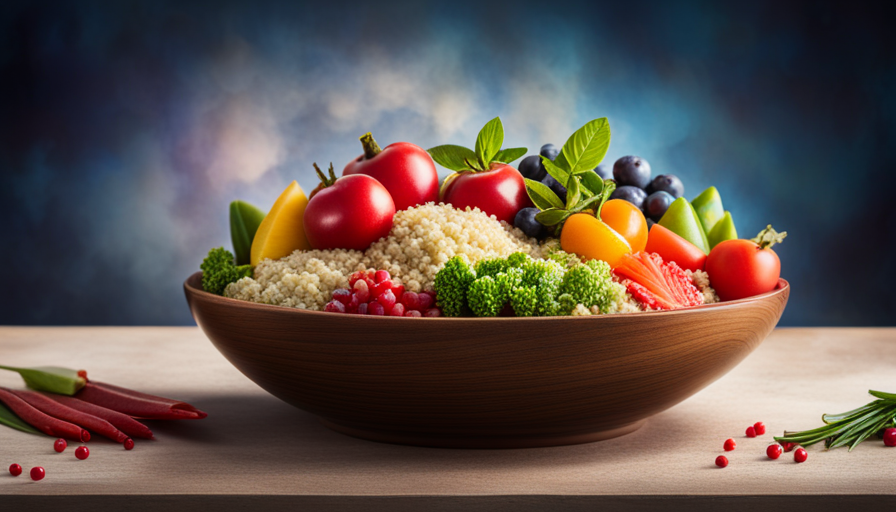Considering if switching to a raw food lifestyle is a good fit for you? Are you ready to embark on a journey to wellness and vitality? If so, this article is crafted to help you determine if a raw food diet aligns with your way of life. By exploring its benefits, potential health effects, personal goals, and food preferences, you will be able to make an informed decision for your well-being.
The raw food lifestyle is alluring, offering an abundance of energy, clearer skin, and weight loss.nnBut is it the right choice for you?nnTo find out, you must assess your dietary preferences and tolerance, as well as research the nutritional requirements of a raw food diet.nnExperimenting with raw food recipes and meal plans will allow you to taste the potential benefits firsthand.nnEqually important is listening to your body’s response to raw foods and addressing any challenges or obstacles that may arise.
By the end of this article, you will have a clear understanding of whether the raw food lifestyle is for you, enabling you to make a conscious decision that aligns with your goals and values.nnSo, let’s dive in and discover if raw food is your path to a healthier, more vibrant life!
Key Takeaways
-
Assess your dietary preferences and tolerance: Before adopting a raw food lifestyle, it is important to evaluate whether you enjoy eating raw foods and if your body tolerates them well. Experiment with raw food recipes and meal plans to see if they align with your taste preferences and digestive system.
-
Consider potential drawbacks and challenges: While there are many benefits to a raw food lifestyle, it is important to be aware of the potential drawbacks such as difficulty meeting nutritional needs for certain vitamins and minerals, the risk of foodborne illnesses, and the long-term effects that are not fully understood. Be prepared for these challenges and consider consulting a healthcare professional or dietitian for personalized advice.
-
Evaluate the alignment with your goals and values: Consider why you want to adopt a raw food lifestyle and how it aligns with your personal goals and values. If reducing environmental impact and supporting animal welfare are important to you, a raw food lifestyle may be a good fit. However, it is important to evaluate the long-term sustainability and impact on your overall well-being.
-
Transitioning tips and self-care: If you decide to transition to a raw food lifestyle, it is helpful to plan meals in advance and stock up on fresh produce. Having raw snacks readily available can also make the transition easier. Prioritize self-care activities to support your overall well-being during this transition period, and be prepared for any challenges that may arise. Remember to consult a healthcare professional for personalized advice, considering potential nutrient deficiencies and the impact on specific medical conditions.
Understanding the Benefits of a Raw Food Lifestyle
If you’re wondering if a raw food lifestyle is right for you, it’s important to understand the numerous benefits it can bring to your overall health and well-being.
Adopting a raw food diet means consuming unprocessed, uncooked, and mostly organic foods such as fruits, vegetables, nuts, and seeds. One of the major advantages of this lifestyle is that it provides your body with a high intake of essential nutrients, enzymes, and antioxidants. These nutrients are often lost during the cooking process, but by eating raw, you maximize their absorption and promote optimal health.
In addition to the nutritional benefits, a raw food lifestyle can also help with weight management. Raw foods are typically low in calories and high in fiber, which can keep you feeling full and satisfied, while also promoting healthy digestion. Many people who switch to a raw food diet find that they naturally shed excess pounds and maintain a healthy weight.
Understanding the potential drawbacks of a raw food lifestyle is also important. While it can be a nutrient-rich and health-promoting way of eating, it may not be suitable for everyone. Some individuals may struggle to meet their nutritional needs, particularly for certain vitamins and minerals like vitamin B12, iron, and calcium, which are more readily available in cooked foods or animal products. It’s essential to plan your meals carefully and potentially consider supplements to ensure you’re getting all the necessary nutrients.
Exploring the environmental impact is another aspect to consider. The raw food lifestyle can be more sustainable and eco-friendly compared to a heavily processed and animal-based diet. Raw foods often require less energy and resources to produce, and they generate less waste. By choosing organic and locally sourced raw foods, you can further reduce your carbon footprint and support sustainable farming practices.
Understanding the benefits of a raw food lifestyle is crucial in determining if it’s the right choice for you. From improved nutrient intake to weight management and environmental impact, there are numerous advantages to adopting this way of eating. However, it’s essential to be aware of the potential drawbacks and ensure you’re meeting your nutritional needs. By making informed decisions and seeking guidance from professionals, you can determine if a raw food lifestyle aligns with your health goals and values.
Exploring the Potential Health Effects
Exploring the potential health effects of embracing a raw food diet can offer valuable insights into the impact it may have on your well-being. While there are numerous benefits associated with a raw food lifestyle, it’s important to also consider the potential risks and long-term effects.
One potential risk of a raw food diet is the risk of nutrient deficiencies. Raw food diets often exclude certain food groups, such as dairy and grains, which can lead to inadequate intake of essential nutrients like calcium, vitamin D, and B vitamins. It’s important to ensure that you’re getting a wide variety of fruits, vegetables, nuts, and seeds to meet your nutrient needs.
Another potential concern is the risk of foodborne illnesses. Raw foods, especially raw animal products like meat and eggs, can harbor harmful bacteria like Salmonella and E. coli. It’s crucial to handle and prepare raw foods properly to minimize the risk of food poisoning.
Additionally, the long-term effects of a raw food diet aren’t fully understood. Some studies suggest that a raw food diet may lead to lower bone density and increased risk of fractures due to inadequate calcium intake. It’s important to monitor your bone health and consider supplementation if needed.
While a raw food diet can offer many health benefits, it’s important to be aware of the potential risks and long-term effects. It’s recommended to consult with a healthcare professional or registered dietitian before making any significant dietary changes to ensure your nutritional needs are being met.
Considering Your Personal Goals and Values
Considering your personal goals and values, it’s important to assess how a raw food diet aligns with your individual aspirations for health and wellbeing. Here are four key factors to consider when evaluating if a raw food lifestyle is the right fit for you:
-
Personal motivations: Reflect on why you’re interested in adopting a raw food diet. Are you seeking to improve your overall health, increase energy levels, or lose weight? Understanding your personal motivations will help you determine if the potential benefits of a raw food diet align with your goals.
-
Nutritional needs: Consider whether a raw food diet can adequately meet your nutritional requirements. While raw fruits, vegetables, nuts, and seeds are nutrient-dense, certain nutrients like vitamin B12 and omega-3 fatty acids may be lacking. You may need to carefully plan your meals or consider supplementation to ensure you’re getting all the necessary nutrients.
-
Ethical considerations: Some individuals choose a raw food diet for ethical reasons, such as reducing their environmental impact or supporting animal welfare. If these values resonate with you, a raw food lifestyle may be a way to align your dietary choices with your ethical beliefs.
-
Sustainability: Evaluate whether a raw food diet is sustainable for you in the long term. Consider factors such as accessibility to fresh produce, time commitment for meal preparation, and social implications. It’s important to choose a dietary approach that you can maintain over time to achieve lasting health and wellbeing.
By considering your personal goals and values, you can make an informed decision about whether a raw food lifestyle is right for you. Remember, it’s always a good idea to consult with a healthcare professional or registered dietitian before making any significant changes to your diet.
Assessing Your Dietary Preferences and Tolerance
Assessing your dietary preferences and tolerance can help determine if a raw food diet is a suitable choice for you based on your individual needs and preferences. One interesting statistic to consider is that according to a study, approximately 70% of individuals who tried a raw food diet reported improved digestion and increased energy levels.
When assessing your dietary preferences, it’s important to consider your taste preferences. Raw food diets primarily consist of fruits, vegetables, nuts, and seeds, which may not appeal to everyone’s taste buds. However, it is possible to incorporate a variety of flavors and textures into a raw food diet by experimenting with different combinations and recipes.
In addition to taste preferences, it’s also crucial to assess your tolerance for raw foods. Some individuals may have difficulty digesting certain raw foods, such as cruciferous vegetables or legumes. This can lead to bloating, gas, or discomfort. If you have any known food intolerances or sensitivities, it’s important to consider how a raw food diet may affect your digestion and overall well-being.
To help you assess your dietary preferences and tolerance, here is a table that compares the pros and cons of a raw food diet:
| Pros | Cons |
|---|---|
| Increased intake of nutrients | Limited food choices |
| Improved digestion | Potential difficulty in meeting |
| Increased energy levels | nutritional needs |
| Weight loss | Possible digestive discomfort |
By carefully evaluating your dietary preferences and tolerance, you can make an informed decision about whether a raw food diet is the right choice for you. Remember to consult with a healthcare professional or registered dietitian before making any drastic changes to your diet.
Researching the Nutritional Requirements of a Raw Food Diet
Researching the nutritional requirements of a raw food diet can provide valuable insights into the specific needs and potential benefits associated with this dietary approach. When considering a raw food lifestyle, it’s important to understand the potential nutritional deficiencies that may arise from excluding certain food groups from your diet.
By researching the nutritional requirements of a raw food diet, you can ensure that you’re meeting your body’s needs and avoiding any potential deficiencies.
Here are three key areas to consider when researching the nutritional requirements of a raw food diet:
-
Essential nutrients: It’s important to understand which nutrients may be lacking in a raw food diet and how to obtain them from alternative sources. Research the specific vitamins and minerals that may be deficient, such as vitamin B12, iron, and omega-3 fatty acids, and identify plant-based sources that can provide these nutrients.
-
Meal planning: Researching meal preparation is crucial to ensure a balanced and varied raw food diet. Look for recipes and meal ideas that incorporate a wide range of fruits, vegetables, nuts, and seeds to provide a diverse array of nutrients. Consider incorporating fermented foods and sprouted grains for additional nutritional benefits.
-
Supplementation: Depending on your individual needs and dietary restrictions, supplementation may be necessary to meet certain nutritional requirements. Research different supplements that are commonly used in a raw food diet, such as algae-based omega-3 supplements or vitamin B12 supplements, and consult with a healthcare professional to determine which ones may be beneficial for you.
By thoroughly researching the nutritional requirements of a raw food diet, you can make informed decisions about your dietary choices and ensure that you’re meeting your body’s needs for optimal health and well-being.
Seeking Guidance from Experts and Experienced Raw Foodists
Seeking guidance from seasoned raw food enthusiasts and experts can be like unlocking a treasure trove of wisdom and insights into the vibrant world of living foods. When embarking on a raw food lifestyle, it’s essential to seek support from those who’ve already walked the path. Connecting with experienced raw foodists can provide you with invaluable tips and tricks, as well as a sense of community that can help you stay motivated and committed.
One of the main benefits of seeking guidance is the opportunity to overcome obstacles that may arise along the way. Transitioning to a raw food diet can be challenging, both mentally and physically. Having the support and advice of experts and experienced individuals who’ve faced similar challenges can make a significant difference in your journey. They can offer practical solutions for common obstacles such as dealing with cravings, finding suitable substitutes for cooked foods, and maintaining a balanced nutrition profile.
Additionally, experts and raw food enthusiasts can provide evidence-based information on the nutritional requirements of a raw food diet. They can guide you on how to ensure you’re getting all the necessary vitamins, minerals, and nutrients from your raw food choices. They can also provide insights into the potential health benefits associated with this lifestyle, helping you make informed decisions about your dietary choices.
Seeking support from experts and experienced raw foodists is crucial when considering a raw food lifestyle. Their guidance can help you overcome obstacles, provide evidence-based information, and create a supportive community that can enhance your overall experience.
Experimenting with Raw Food Recipes and Meal Plans
Get ready to embark on a culinary adventure as you dive into the world of delicious and nutritious raw food recipes and meal plans! Experimenting with raw food recipes and meal plans is a great way to determine if the raw food lifestyle is for you. By trying out different raw food meal ideas, you can discover new flavors, textures, and combinations that you may have never considered before.
There are numerous resources available for finding raw food recipe inspiration. Websites, cookbooks, and online communities are all great places to start. Look for recipes that incorporate a variety of fruits, vegetables, nuts, and seeds to ensure you’re getting a balanced and nutrient-rich meal. Don’t be afraid to get creative and try new things – raw food recipes can be surprisingly diverse and satisfying.
When planning your meals, it’s important to consider your nutritional needs. Make sure to include a variety of fruits and vegetables to get a wide range of vitamins and minerals. Incorporate sources of protein, such as nuts, seeds, and legumes, to ensure you’re getting enough essential amino acids. And don’t forget about healthy fats! Avocado, coconut, and nuts are all great options.
So, grab your apron and get ready to discover a whole new world of raw food meal ideas and recipes. Who knows, you might just find your new favorite dish!
Listening to Your Body’s Response to Raw Foods
Pay attention to your body’s signals and listen to its whispers as you indulge in the vibrant world of raw cuisine – your taste buds will dance with delight! When transitioning to a raw food lifestyle, it’s important to tune in and understand how your body responds to this new way of eating.
Each person’s body is unique, and what works for one may not work for another. By paying attention to your body’s signals, you can determine if the raw food lifestyle is for you.
One of the key things to watch out for is any food sensitivities. Raw foods are rich in enzymes, vitamins, and minerals, but they can also be challenging for some individuals to digest. If you notice any bloating, gas, or discomfort after consuming certain raw foods, it may be a sign of a food sensitivity. Keep a food diary and note any reactions you experience. Over time, you may start to see patterns and identify specific foods that don’t agree with your body.
Additionally, paying attention to how your body feels after eating raw foods can provide valuable insight. Do you feel energized and satiated, or do you experience a dip in energy levels? Are you able to maintain a healthy weight and meet your nutritional needs? These are all important considerations when determining if the raw food lifestyle is right for you.
Listening to your body’s signals is crucial when exploring the raw food lifestyle. By being mindful of any food sensitivities and paying attention to how your body responds, you can make informed decisions about whether this way of eating is a good fit for you. Trust your body’s wisdom and enjoy the journey of discovering what works best for you.
Addressing Potential Challenges and Obstacles
Facing challenges and obstacles is an inevitable part of embracing the vibrant world of raw cuisine. But fear not, there are ways to overcome these hurdles and continue on your journey towards a raw food lifestyle. Here are some practical tips to help you address potential challenges and find the support you need:
-
Recognize and overcome cravings: Cravings for cooked or processed foods can be a common challenge when transitioning to a raw food diet. To overcome these cravings, try incorporating more variety into your raw meals, experimenting with new flavors and textures, and finding healthy alternatives to satisfy your cravings.
-
Find support: Surrounding yourself with like-minded individuals can make a big difference in your raw food journey. Look for local raw food communities, join online forums or social media groups, and connect with others who can provide guidance, share recipes, and offer support when you face challenges.
-
Educate yourself: Knowledge is power when it comes to overcoming challenges. Take the time to learn about the benefits of raw food, the science behind it, and practical tips for success. By understanding the reasons behind your choices, you’ll be better equipped to stay motivated and overcome any obstacles that come your way.
-
Plan ahead: Being prepared is key to staying on track with your raw food lifestyle. Plan your meals in advance, stock up on fresh produce, and have raw snacks readily available. This will help you avoid temptations and make healthy choices when faced with challenges.
-
Practice self-care: Taking care of your physical, emotional, and mental well-being is crucial. Prioritize self-care activities such as meditation, exercise, and relaxation techniques to support your overall health and resilience in overcoming challenges.
Embracing a raw food lifestyle can bring about amazing benefits, but it’s important to be prepared for challenges along the way. By implementing these practical strategies and finding the support you need, you can navigate any obstacles and continue enjoying the vibrant world of raw cuisine.
Making an Informed Decision for Your Well-being
Discover the transformative power of embracing a raw food lifestyle and take charge of your well-being by making an informed decision that nourishes your mind, body, and soul.
When considering if a raw food lifestyle is right for you, it’s important to weigh the pros and cons. Raw food enthusiasts believe that consuming raw, unprocessed foods can improve digestion, boost energy levels, and promote weight loss. However, it’s essential to consider potential challenges and obstacles that may arise, such as the need for careful meal planning and potential nutrient deficiencies.
To make an informed decision about adopting a raw food lifestyle, it’s highly recommended to consult a healthcare professional. They can provide personalized advice based on your individual health needs and goals. A healthcare professional can help identify any potential risks or concerns, such as nutrient deficiencies or the impact of a raw food diet on specific medical conditions. They can also offer guidance on proper food preparation and ensure that you’re meeting your nutritional requirements.
Embracing a raw food lifestyle can have numerous benefits for your overall well-being. However, it’s important to consider the potential challenges and obstacles that may arise. By weighing the pros and cons and consulting a healthcare professional, you can make an informed decision that supports your health goals and ensures that you’re nourishing your mind, body, and soul.
Frequently Asked Questions
Can I still eat cooked food occasionally while following a raw food lifestyle?
Yes, you can still enjoy cooked food occasionally while following a raw food lifestyle. It’s all about finding a balance that works for you. However, it’s important to choose healthier alternatives to traditional cooked foods. For example, you can try steaming or lightly sautéing vegetables instead of frying them. Transitioning to a raw food lifestyle is a personal journey, and it’s up to you to experiment and find what works best for your body and lifestyle.
What are some common misconceptions about a raw food lifestyle?
Common misconceptions about a raw food lifestyle abound, but let’s set the record straight! Contrary to popular belief, a raw food diet isn’t just a fad or a mere trend. It offers numerous benefits, including improved digestion, increased energy levels, and enhanced nutrient absorption. Moreover, weight loss is often a pleasant side effect of this eating approach.
So, don’t be fooled by the naysayers – give the raw food lifestyle a try and experience its amazing advantages for yourself!
How can I ensure I am getting enough protein on a raw food diet?
To ensure you’re getting enough protein on a raw food diet, it’s important to consider the raw food vs. cooked food debate. While some argue that cooking destroys nutrients, others believe that certain foods are more nutritious when cooked.
However, if you choose a raw food diet, there are still plenty of high protein options. These include nuts, seeds, legumes, and even certain vegetables. It’s also beneficial to combine different plant-based protein sources to ensure you’re getting a complete amino acid profile.
Can a raw food diet be sustainable and affordable in the long term?
A raw food diet can be both sustainable and affordable in the long term. By incorporating a variety of fruits, vegetables, nuts, and seeds, you can ensure a balanced and nutrient-rich diet. Buying local and seasonal produce can help reduce costs and support sustainability. Additionally, growing your own fruits and vegetables can be a cost-effective and rewarding way to sustain a raw food lifestyle. With proper planning and resourcefulness, you can make raw food a sustainable and affordable choice.
Are there any potential side effects or risks associated with a raw food lifestyle?
Potential side effects and risks associated with a raw food lifestyle include health concerns and nutritional deficiencies. It’s important to note that a raw food diet may not provide all the essential nutrients needed for optimal health.
Some individuals may experience digestive issues, such as bloating and gas, due to the high fiber content of raw foods. Additionally, there’s a risk of foodborne illnesses from consuming raw or undercooked foods.
It’s advisable to consult with a healthcare professional before starting a raw food lifestyle to ensure it’s suitable for your individual needs.
Is a Raw Food Lifestyle Safe for Colonists and How Can It Be Prioritized in Cooking?
When establishing a raw food lifestyle for colonists on a new planet, it’s crucial to prioritize cooking food colony’s diet to ensure safety. By focusing on proper food preparation and maintaining strict hygiene standards, colonists can enjoy the benefits of a raw food diet without compromising their health in their new environment.
How Does Eating Raw Food Affect Your Health and Lifestyle Choices?
Eating raw food can positively impact your health and lifestyle choices. Those who prioritize cooking food miss out on the nutrients raw vegetables and fruits provide. Additionally, raw food can reduce the risk of chronic diseases and help maintain a healthy weight. Join the raw food colony for a vibrant lifestyle.
Conclusion
In conclusion, deciding whether the raw food lifestyle is right for you requires careful consideration and self-reflection. Remember to listen to your body and pay attention to its response to raw foods.
It’s interesting to note that a study published in the Journal of Nutrition and Dietetics found that individuals following a raw food diet had significantly lower body mass indexes (BMIs) compared to those on a conventional diet. This statistic highlights the potential health benefits of a raw food lifestyle.
Ultimately, make an informed decision that aligns with your goals and values for optimal well-being.










